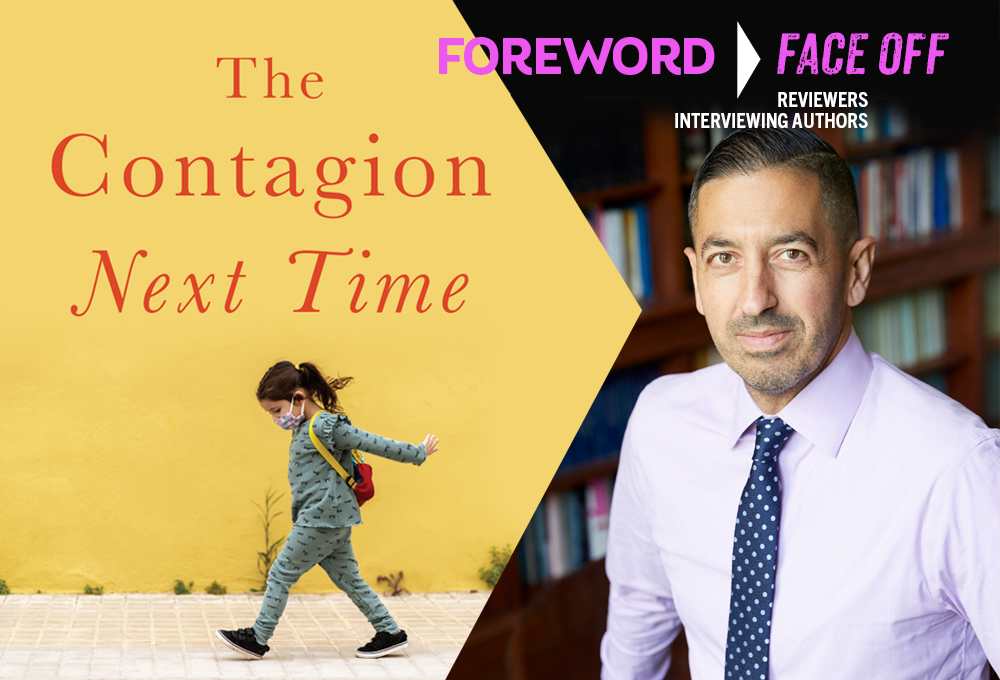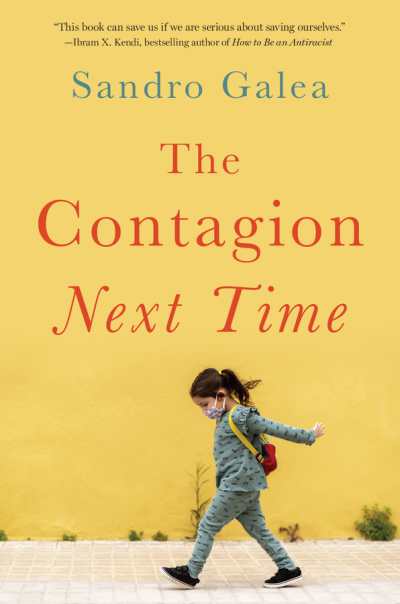Reviewer Ho Lin Interviews Sandro Galea, Author of The Contagion Next Time

When it happens—and it will happen—we can’t say we weren’t warned.
No, we’re not talking about hair loss. What we’re pointing to are all the warnings about something much more serious, perhaps even to the tune of hundreds of millions of people dying.
Okay, you’re on to us. After Delta and Omicron, you know that another Covid variant, or even a Black Plague-like calamity, is something we can count on in the coming years.

This week, we’re joined by the dean at the Boston University School of Public Health, Dr. Sandro Galea. Surprisingly, he’s in a good mood, and part of his optimism comes from how we’ve responded to Covid thus far.
“Certainly, our response was not perfect,” he says in the interview below, but “beneath the political noise of the moment were countless example of compassion, mutual care, and an understanding that health is a public good. If we can apply this sentiment to making the structural changes necessary to prevent the contagion next time, we have a chance of creating a healthier future.
Dr. Sandro’s The Contagion Next Time earned a starred review in Foreword’s November/December issue from reviewer Ho Lin. With the help of OUP, we got Ho and Sandro together for a chat.
Happy holidays to all!
Epidemiology is so expansive and multi-disciplinary in scope—in effect, you’re analyzing every factor that can impact the health of an entire population. What influenced you to go down this career path, and what excites you about it?
I began my career in emergency medicine, which was initially quite satisfying until I started to feel my efforts at treating sickness were doing little to address the foundational causes of disease. Epidemiology provided an opportunity to address these causes at the population level. Perhaps the most exciting part about this work has been seeing the conversation about health change over the years, to include greater consideration of the foundational drivers of health, which have long been eclipsed by a focus on doctors and treatments alone. To be in a position to witness this change, and to help inform it by engaging with the broader conversation about health through books like The Contagion Next Time, is a privilege indeed.
In The Contagion Next Time, as in your previous work, you emphasize the interconnectedness of public health with political, economic, and environmental shifts. In your view, what will it take to help us reach a tipping point where policymakers understand and respond appropriately to these connections?
Hopefully, that tipping point was COVID-19, with the lessons of the pandemic informing the creation of a healthier world. The central argument of The Contagion Next Time is that the next pandemic could be much worse than COVID-19; it is in our collective interest, then, to make sure this is indeed the tipping point, so we can forestall an even greater catastrophe in the future.
As you point out in the book, much of the response to COVID has been politicized. How would you respond to those who might charge you with being politically radical or biased, especially when it comes to your views on economic justice, and how minorities are receiving inadequate healthcare due to racial and economic inequalities?
COVID-19 was a radical moment, which fundamentally altered how we live. It was a reminder that shocks can indeed come, that the world changes dramatically regardless of whether or not we consciously choose to pursue such change. In the face of this reality, it strikes me as far more radical to do nothing, to accept a course of moderation even as paradigms are upended all around us by forces beyond our individual control. Policy is always provisional, subject to the unique demands of the moment. What might be radical at one time could be, under different circumstances, the more prudent option. Having gone through COVID-19, and facing the possibility of future contagion, I would argue that now is the time for a transformative vision of what is possible—indeed, necessary—in the pursuit of health.
I was particularly struck by your concluding chapters, in which you argue that we should find a mindset that can accept complexity and doubt when confronting health crises. How do we collectively arrive at such a point, when modern-day society seems to privilege and incentivize black-and-white thinking?
The fact is, the world is complex. We can either align ourselves with this reality or we can resist it through great effort and collective risk. While there is much in our society to incentivize the denial of complexity, there is only so much we can do before reality asserts itself. Hopefully, COVID-19 helped convince us that to elide this reality is, ultimately, to do a disservice to our capacity to build a healthier world.
It’s ironic that you completed The Contagion Next Time just before the Delta variant of COVID-19 broke out. How would you evaluate the general response to Delta compared to what we saw with the first outbreak of COVID? What would you say we’ve handled better, or worse?
The core argument of The Contagion Next Time is that we were vulnerable to a pandemic because of longstanding social, economic, and political issues in our society. We were vulnerable because of income and wealth inequality, because of racial injustice, because of substandard housing, because of class divides, because of challenges to our education system, and other such factors. These conditions shaped the Delta variant just as much as they shaped the initial outbreak of the virus. As long as this status quo remains in place, we are not prepared for the next pandemic.
One could argue that with the Delta variant, we’re now seeing the contagion next time. What do you think the next contagion after this looks like?
In historical terms, COVID-19 was not a very lethal disease. Compared to the Black Death or even the so-called Spanish Flu outbreak at the beginning of the 20th century, it was—for all the devastation it caused—quite minor. The reason is luck. There is nothing to guarantee that this luck will hold when the next pandemic emerges. The next contagion could well be just as transmissible as COVID-19, but with a much greater capacity to kill. It is not enough to hope we will avoid this fate. We must take steps now to build a healthier world, where such contagion cannot take hold.
Despite all the difficulties and obstacles you point out in the book, you seem to maintain a fundamental optimism about our ability to change for the better. What evidence have you seen that drives that optimism?
I am by nature optimistic; I also have the privilege of being dean of a school of public health, where each day I get to see the rising generation show a level of passion and commitment to tackling core issues that is easy to be inspired by. More broadly, I think there was much cause for optimism in how we came together, collectively, in the face of the pandemic. Certainly, our response was not perfect. But beneath the political noise of the moment were countless example of compassion, mutual care, and an understanding that health is a public good. If we can apply this sentiment to making the structural changes necessary to prevent the contagion next time, we have a chance of creating a healthier future.
Ho Lin
